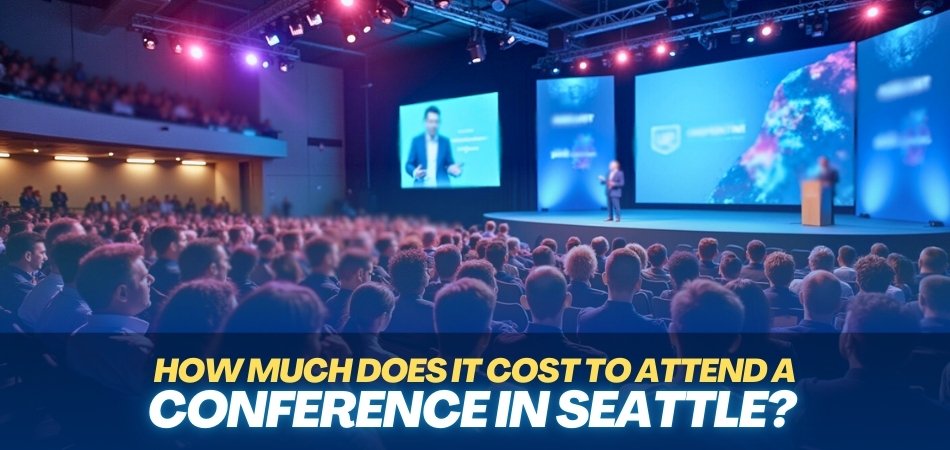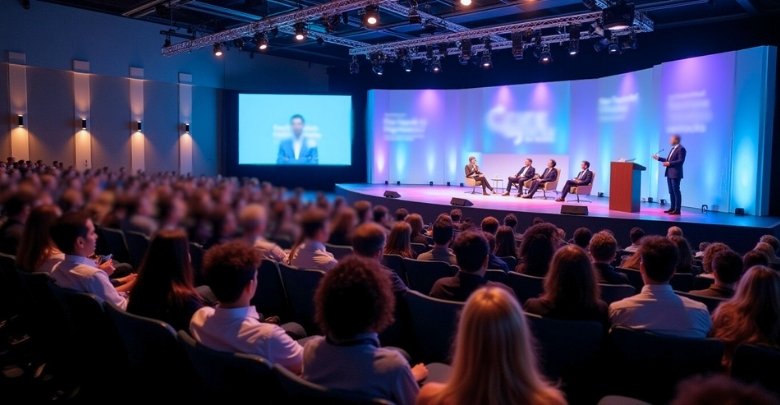A conference in Seattle offers a great opportunity to network, learn, and experience the city’s vibrant culture. However, before booking your ticket, it’s essential to consider the costs involved. But, how much does it cost to attend a conference in Seattle?
Attending a conference in Seattle can cost anywhere from $1500 to $3,500 in total for a single person. This includes registration fees, accommodation, transportation, meals, and other expenses. Costs vary based on the conference size, amenities, and your personal choices for travel and lodging.
Proper planning and budgeting for these expenses are crucial to avoid surprises. Stay with us to learn more about how to manage the costs and make the most of your Seattle conference experience.
How Much Does It Cost to Attend a Conference in Seattle?
The cost of attending a conference in Seattle can range from $1,500 to $3,500 per person. Event prices are determined by specifics such as duration, location, and amenities. There are also other factors that can influence your trip’s cost. The following are details about the factors that influence the cost:

Event Duration
The length of the conference plays a significant role in determining costs. A multi-day event usually includes higher registration fees. Longer conferences often offer more sessions, workshops, and networking opportunities. As a result, the total cost increases accordingly, especially for extensive programs.
Longer events also require additional accommodation and meal expenses. More days at a conference will mean additional nights at hotels. The overall experience will likely be more intensive, driving up the price. This includes more time for travel and other related activities.
Event Location
The conference’s location within Seattle can greatly affect its price. Premium venues, such as downtown Seattle, typically have higher event fees. Many upcoming conferences in Seattle choose central locations to attract more attendees. Proximity to popular tourist spots or business districts also raises the overall pricing.
Venues with exclusive services like catering, transportation, and access to special attractions may cost more. These added services often create a premium experience for attendees. Additionally, traveling to a central location adds to travel expenses. Expect higher prices in popular districts compared to less central areas.
Amenities and Services
Conferences with high-end amenities such as gourmet catering or VIP access come at a premium. Amenities like exclusive networking events, lounges, or social gatherings can significantly raise costs. Organizers may also provide advanced technology, such as live streaming or special guest speakers. These enhancements can improve the experience but add to the total price.
Services like event transportation, access to additional workshops, and swag bags can also raise your costs. Depending on the type of experience you choose, your overall bill may increase. However, these amenities often contribute to the quality of the event. Attendees should weigh these factors when budgeting for the conference.
Accommodation and Travel
Accommodation plays an essential role in determining your total conference cost. Hotels in Seattle, especially near conference venues, can be pricey, particularly during peak seasons. Depending on the length of stay, this can become a significant expense. Budget hotels may lower your costs but provide fewer comforts.
Travel expenses, including flights or other transportation methods, also impact the overall cost. The farther you are from Seattle, the higher your travel costs will be. Additionally, local transportation like taxis or ride-sharing services adds up quickly. Booking early can help reduce both travel and accommodation costs.
Meals and Extra Expenses
Meals and extra expenses should be factored in when estimating your total cost. Conferences may offer meals as part of the package, but additional snacks or drinks can add up. Dining at local restaurants, especially in the city center, can be expensive. Attendees should plan their food budget based on the event schedule and location.
Other expenses might include tips, souvenirs, or optional paid activities. These incidental costs can vary depending on the length and nature of the event. It’s important to consider these additional charges when estimating your budget. By planning ahead, you can avoid unexpected financial surprises during your trip.
Best Ways for International Attendees to Manage Their Costs in Seattle
It can be a great opportunity for international attendees to attend a conference in Seattle, but managing costs is important. By planning ahead and making smart choices, international attendees can ensure that their trip stays within their budget. Here are some practical ways to help control expenses while still enjoying the experience.
Book Flights Early
Booking flights months in advance can significantly reduce travel expenses. Keep an eye out for sales and discounts from major airlines. Flexible travel dates can help you find cheaper flight options. Consider flying to nearby airports to save on airfare costs.
Choose Budget-Friendly Accommodation
Consider staying at budget hotels, hostels, or vacation rentals to cut down on accommodation expenses. Look for places offering free amenities like breakfast or Wi-Fi. Sharing a room with fellow attendees can also reduce costs. Staying slightly outside downtown may offer better deals.
Use Public Transportation
Seattle has an efficient public transportation system, including buses, light rail, and streetcars. Using public transit is cheaper than taxis or rental cars. Purchasing a transit pass can save money on daily commuting. Many conference venues are accessible via public transportation, adding convenience.
Take Advantage of Conference Perks
Many conferences provide free meals, refreshments, or discounts on local attractions. Exclusive hotel rates or travel packages are often available for conference attendees in Seattle, offering valuable savings. Make the most of networking events to avoid additional meal costs. Use conference schedules to plan affordable meal breaks.
Budget for Meals and Extras
Set a daily budget for meals and stick to it to avoid overspending. Explore local markets or grocery stores for affordable dining options. Many Seattle attractions offer free or low-cost activities. Be mindful of extra costs like souvenirs or paid tours.
Plan for Currency Exchange and Fees
Use international-friendly credit cards to avoid hefty foreign transaction fees. Withdraw cash only when needed to minimize ATM charges. Compare exchange rates and choose the best option for currency conversion. Avoid exchanging money at airports, where rates are often less favorable.
What Additional Expenses Should You Prepare For?
When attending a conference, it’s important to consider additional expenses beyond the basic registration fees. These costs can vary depending on the event and location, so planning ahead will help. Here are some additional expenses you should be prepared for when attending a conference:
- Local Transportation Costs: Aside from airport transfers, you may need to travel within the city. Budget for buses, taxis, rideshares, or even bike rentals.
- Wi-Fi and Communication Fees: International attendees may face roaming charges or need a local SIM card. Many conference venues offer Wi-Fi, but it’s not always free.
- Printing and Office Supplies: You might need to print documents or purchase office supplies. Some conferences provide resources, but additional materials might be required.
- Laundry Services: Longer stays often require laundry services, which can be pricey. Consider costs for hotel laundry, laundromats, or cleaning services.
- Health and Wellness Expenses: Unexpected medical needs can arise, requiring medication or doctor visits. Budget for over-the-counter medications or emergency healthcare, just in case.
- Networking and Social Events: Conferences often include optional events like dinners or excursions. These can offer valuable networking opportunities but often come with extra costs.
- Souvenirs and Shopping: Exploring local markets and shops can be tempting. Set a limit for gifts and personal purchases to avoid overspending.
- Service Charges and Tips: Many services in the U.S. expect tips, including restaurants, hotels, and transportation. Ensure you have cash or allocate funds for tipping.
How Location and Season Affect Conference Costs in Seattle?
The location of a conference in Seattle greatly influences the overall cost. Events held in popular downtown venues are generally more expensive. The convenience of being near hotels, restaurants, and attractions often leads to higher venue and accommodation fees.
Seasonal factors also play a significant role in conference pricing. Summer and early fall are peak tourist seasons in Seattle, driving up hotel and travel costs. Off-peak months like winter and early spring often provide more affordable options for budget-conscious attendees.
Weather impacts both travel expenses and conference experiences. Rainy seasons may lead to lower prices but can affect outdoor activities. Choosing the right season can help balance costs and provide a comfortable experience for conference-goers.
Comparing One-Day vs. Multi-Day Conference Costs
Costs of attending a Seattle conference can vary greatly based on whether the conference is one-day or multi-day. Each option has its own set of advantages and potential expenses. Here’s a quick comparison to help you choose the best fit for your budget and schedule.
| Aspect | One-Day Conference | Multi-Day Conference |
| Registration Fees | Lower costs, typically between $100 to $500. | Higher fees, ranging from $500 to $2,000. |
| Accommodation Costs | Usually not required unless traveling long distances. | Requires multiple nights, increasing hotel expenses. |
| Travel Expenses | Often a single round trip or commute. | Higher travel costs due to longer stays. |
| Meals and Refreshments | Limited meals are provided, often just lunch. | Multiple meals included or additional dining expenses. |
| Networking Opportunities | Shorter time for networking and socializing. | More opportunities to connect with peers. |
| Learning Sessions | Fewer sessions and workshops. | Access to more in-depth sessions and training. |
| Time Commitment | Minimal disruption to the regular schedule. | Requires taking time off work or adjusting plans. |
| Additional Costs | Lower chances of extra expenses like laundry. | More chances for hidden costs. |
| Event Experience | Quick, focused learning experience. | Immersive experience with a broader perspective. |
| Overall Value | Cost-effective for specific goals. | Better long-term value through deeper engagement. |
Why Do Conference Costs Vary Across Different Industries?
There can be a significant difference in conference costs based on the industry. Factors like venue requirements, speaker fees, and audience expectations all play a role. Knowing why costs differ can help attendees budget better and choose events that are right for them. Listed below are some reasons why conference costs vary from industry to industry
Venue Requirements
Different industries require different types of venues. Tech conferences may need advanced audiovisual equipment and large exhibition spaces. Creative industries might prefer unique, inspiring venues, which can drive up costs. Some industries need specific facilities, impacting the overall event budget.
Speaker and Talent Fees
The cost of speakers varies widely across industries. High-demand experts, especially in business or tech, often charge premium fees. Creative or academic conferences might rely on lower-cost speakers or community experts. The caliber of speakers directly influences registration costs.
Technology and Equipment Needs
Some industries, like healthcare or technology, require specialized equipment for presentations. This equipment often includes advanced displays, medical devices, or interactive tools. Renting or purchasing these technologies adds to event costs. Conferences with basic needs, like projectors, typically have lower expenses.
Networking and Social Events
Business conferences often include formal networking events, which add to costs. These may involve dinners, mixers, or team-building activities. Industries focused on research or education might prioritize workshops over expensive social events. The type of networking expected influences the event’s pricing.
Marketing and Branding Expenses
Corporate conferences may invest heavily in branding and marketing. This can include custom materials, signage, and promotional giveaways. Academic or nonprofit events often have smaller marketing budgets. The scale of promotion affects both ticket prices and overall costs.
Audience Expectations
Attendees in certain industries expect higher-end amenities and unique experiences. Business professionals find value in attending conferences in Seattle, which are complemented by luxury accommodations and fine dining. Creative industries might prioritize innovative and immersive experiences over traditional settings. Conferences adapt to these expectations, influencing the total cost and overall experience.
Frequently Asked Questions
If you’re considering attending a conference in Seattle, it’s important to understand the costs involved. Below are some frequently asked questions that can help you budget and plan your conference experience.
What Are the Most Affordable Times to Attend a Conference in Seattle?
The most affordable times are typically winter and early spring when fewer tourists visit. Hotels and flights are cheaper. Booking early helps secure discounts for both travel and accommodation. You can save money on travel expenses if you avoid peak tourist months.
Are There Any Discounts for Conference Attendees in Seattle?
Some conferences offer early-bird registration discounts or group pricing. Look for discounts available for students or non-profit organizations. Check if any special deals for accommodation and transportation are offered. Early registration is key to securing the best rates for conferences.
Is It Possible to Attend a Conference in Seattle on a Tight Budget?
Yes, attending a conference on a budget is possible with early planning. Look for low-cost accommodation options like hostels or Airbnb. Use public transportation instead of taxis to cut down on travel expenses. Many conferences also offer free networking events or meals that can help reduce costs.
How Can I Find Affordable Accommodation for Conferences in Seattle?
Look for budget accommodations like hostels, guesthouses, or Airbnb rentals outside of the city center. Compare hotel prices and search for conference rates or discounts. Consider sharing accommodations with other attendees to reduce costs. Booking early often helps secure the best deals for affordable options.
Do I Need to Budget for Extra Fees When Attending a Conference?
Yes, consider additional costs like local transportation, Wi-Fi, and printed materials. Conferences often charge extra for things like workshops or special sessions. Be mindful of incidental costs such as meals, tips, and souvenirs. Having a buffer in your budget helps prevent unexpected financial surprises.
Bottom Line
When considering how much does it cost to attend a conference in Seattle? it’s clear that costs can vary widely based on event duration, location, and amenities. Additional factors like travel, accommodation, meals, and industry-specific requirements also influence the overall budget. A budget-friendly option, planning ahead, and leveraging conference perks can drastically reduce costs.
Whether attending a one-day or multi-day event, being aware of the elements that affect pricing can help you make informed decisions. By balancing costs with the value of networking and learning opportunities, conference-goers can maximize their experience while staying within their budget. As a unique combination of professional growth and cultural exploration, Seattle is a worthwhile investment for both domestic and international visitors.







